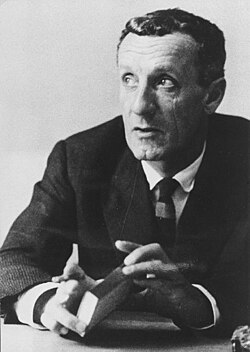 |
Gecemiz.az |
Moris Merlo Ponti (fr. Maurice Jean Jacques Merleau-Ponty;[7] 14 mart 1908[1][2][…], Rochefort, Dənizkənarı Şaranta[4] – 3 may 1961[1][3][…], VI arondisman[5] və ya Paris[4]) — XX əsrin məşhur fransız filosofu, fenomenologiya, ekzistensializm və qavrayış fəlsəfəsi sahəsində aparıcı simalardan biri. O, Edmund Husserlin və Martin Haydeggerin fenomenoloji yanaşmalarını inkişaf etdirərək insan bədəninin və şüurunun qarşılıqlı əlaqəsini fəlsəfi tədqiqatın mərkəzinə çevirmişdir.[8][9] Merlo Ponti əsasən qavrayış, bədən və dünya arasındakı münasibətləri araşdıraraq "bədənli şüur" (fr. corps propre) anlayışını formalaşdırmışdır.[10]
| Moris Merlo Ponti | |
|---|---|
| fr. Maurice Merleau-Ponty | |
 | |
| Doğum tarixi | 14 mart 1908(1908-03-14)[1][2][…] |
| Doğum yeri | |
| Vəfat tarixi | 3 may 1961(1961-05-03)[1][3][…] (53 yaşında) |
| Vəfat yeri |
|
| Vəfat səbəbi | ürək tutması |
| Dəfn yeri | |
| İstiqaməti | fenomenologiya[6], strukturalizm |
| Əsas maraqları | fəlsəfə |
| Təsirlənib | Edmund Husserl[6], Karl Marks, Martin Haydeqqer |
Moris Merlo Ponti 1908-ci ildə Fransanın Roşfor şəhərində anadan olmuşdur.[11] O, Parisdə yerləşən Yüksək nomal məktəbində təhsil almış və burada Jan Pol Sartr ilə dostlaşmışdır.[12] 1945-ci ildə Sorbonna Universitetində fəlsəfə professoru olmuş və 1952-ci ildən ömrünün sonuna qədər Kollec de Fransda professor vəzifəsində çalışmışdır. O, həm də "Les Temps Modernes" adlı jurnalın həmtəsisçisi və redaktoru olmuşdur.[13]
Merlo Ponti öz fəlsəfəsində qavrayışın ilkin və əsas idrak forması olduğunu vurğulayır.[14] Onun fikrincə, insan dünyanı düşüncə ilə deyil, ilk növbədə bədən vasitəsilə qavrayır. Bu baxımdan, bədən sadəcə bir obyekt deyil, həm də dünyada yönəlmiş fəaliyyətin mərkəzidir.[15] Merlo Ponti "intentionallıq" anlayışını Husserldən götürərək onu bədənli təcrübə ilə birləşdirmişdir. O, subyekt və obyekt arasında sərt ayırımı rədd edərək onların qarşılıqlı təsir içində başa düşülməsini təklif edir.[16]
Merlo Ponti fenomenologiya, psixologiya, estetika, təhsil və memarlıq kimi bir çox sahələrdə dərin təsir buraxmışdır. Onun fikirləri müasir kognitiv elmlər və bədən fəlsəfəsində də aktual olaraq qalır. O, həm klassik, həm də çağdaş filosoflar arasında körpü rolunu oynamışdır.[17]
Moris Merlo Ponti 1961-ci ilin mayında 53 yaşında qəfil infarktdan vəfat etmişdir. O, ömrünün son dövrlərində dil və varlıq arasındakı əlaqələri araşdırırdı və yarımçıq qalmış əsərlərində dilin fenomenologiyası ilə məşğul olurdu.[18]
Aşağıdakı cədvəldə Merlo Pontinin fransız və ingilis dillərinə tərcümə edilmiş, seçilmiş əsərləri verilmişdir.
| İl | Fransızca | İngiliscə |
|---|---|---|
| 1942 | La Structure du comportement (Paris: Presses Universitaires de France, 1942) | The Structure of Behavior – trans. by Alden Fisher (Boston: Beacon Press, 1963; London: Methuen, 1965) |
| 1945 | Phénoménologie de la perception (Paris: Gallimard, 1945) | Phenomenology of Perception – trans. by Colin Smith (New York: Humanities Press, and London: Routledge & Kegan Paul, 1962); trans. revised by Forrest Williams (1981; reprinted, 2002); new trans. by Donald A. Landes (New York: Routledge, 2012) |
| 1947 | Humanisme et terreur, essai sur le problème communiste (Paris: Gallimard, 1947) | Humanism and Terror: An Essay on the Communist Problem – trans. by John O'Neill (Boston: Beacon Press, 1969) |
| 1948 | Sens et non-sens (Paris: Nagel, 1948, 1966) | Sense and Non-Sense – trans. by Hubert Dreyfus and Patricia Allen Dreyfus (Evanston: Northwestern University Press, 1964) |
| 1949–50 | fr. Conscience et l'acquisition du langage (Paris: Bulletin de psychologie, 236, vol. XVIII, 3–6, Nov. 1964) | Consciousness and the Acquisition of Language – trans. by Hugh J. Silverman (Evanston: Northwestern University Press, 1973) |
| 1949–52 | Merleau-Ponty à la Sorbonne: résumé de cours, 1949-1952 (Grenoble: Cynara, 1988) | Child Psychology and Pedagogy: The Sorbonne Lectures 1949-1952 – trans. by Talia Welsh (Evanston: Northwestern University Press, 2010) |
| 1951 | Les Relations avec autrui chez l'enfant (Paris: Centre de Documentation Universitaire, 1951, 1975) | The Child's Relations with Others – trans. by William Cobb in The Primacy of Perception ed. by James M. Edie (Evanston: Northwestern University Press, 1964), 96-155 |
| 1953 | Éloge de la Philosophie, Lecon inaugurale faite au Collége de France, Le jeudi 15 janvier 1953 (Paris: Gallimard, 1953) | In Praise of Philosophy – trans. by John Wild and James M. Edie (Evanston: Northwestern University Press, 1963) |
| 1955 | Les aventures de la dialectique (Paris: Gallimard, 1955) | Adventures of the Dialectic – trans. by Joseph Bien (Evanston: Northwestern University Press, 1973; London: Heinemann, 1974) |
| 1958 | Les Sciences de l'homme et la phénoménologie (Paris: Centre de Documentation Universitaire, 1958, 1975) | Phenomenology and the Sciences of Man – trans. by John Wild in The Primacy of Perception ed. by James Edie (Evanston: Northwestern University Press, 1964), 43–95 |
| 1960 | Éloge de la Philosophie et autres essais (Paris: Gallimard, 1960) | In Praise of Philosophy and Other Essays – trans. by John Wild, James M. Edie and John O'Neill (Northwestern University Press, 1988) |
| 1960 | Signes (Paris: Gallimard, 1960) | Signs – trans. by Richard McCleary (Evanston: Northwestern University Press, 1964) |
| 1961 | L'Œil et l'esprit (Paris: Gallimard, 1961) | Eye and Mind – trans. by Carleton Dallery in The Primacy of Perception ed. by James Edie (Evanston: Northwestern University Press, 1964), 159–190; revised translation by Michael Smith in The Merleau-Ponty Aesthetics Reader (1993), 121-149 |
| 1964 | Le Visible et l'invisible, suivi de notes de travail – edited by Claude Lefort (Paris: Gallimard, 1964) | The Visible and the Invisible, Followed by Working Notes – trans. by Alphonso Lingis (Evanston: Northwestern University Press, 1968) |
| 1968 | Résumés de cours, Collège de France 1952-1960 (Paris: Gallimard, 1968) | Themes from the Lectures at the Collège de France, 1952-1960 – trans. by John O'Neill (Evanston: Northwestern University Press, 1970) |
| 1969 | La Prose du monde (Paris: Gallimard, 1969) | The Prose of the World – trans. by John O'Neill (Evanston: Northwestern University Press, 1973; London: Heinemann, 1974) |
During the liberation of Paris he joined an armed street patrol.